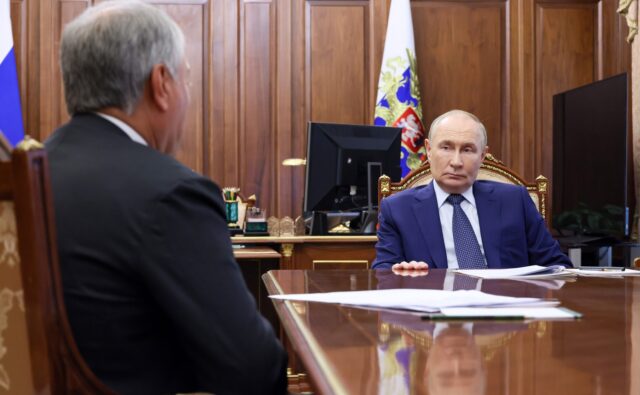
Moscow Seeks to Control Internet by Fining Russians Searching for Content it Deems ‘Extremist’
Publication: Eurasia Daily Monitor Volume: 22 Issue: 109
By:

Executive Summary:
- Starting September 1, Moscow will fine Russians for accessing or searching for “extremist” content, including via virtual private network (VPN) technology, to control how Russians use the Internet without fully blocking it.
- The Putin regime has taken these steps to limit the growing impact of the Internet in ways that it hopes will not lead to either international opprobrium or the negative impact a complete shutdown would have on government operations, business, and research.
- This move will cast yet another pall over Russian life, but it is unlikely that it will cause all Russians to stop looking at what Moscow does not want them to see completely, unless the authorities impose such penalties far more widely.
On July 22, the Russian State Duma adopted a bill allowing the authorities to fine Russians who visit websites containing “extremist” materials, use virtual private networks (VPNs) to access blocked sites, or search online for “knowingly extremist” materials, effective September 1 (SOVA Center, July 16; Versia, July 17; Ideal Realii, July 19; The Moscow Times, July 22). Despite widespread anger, including from some of the closest Kremlin loyalists, the Vladimir Putin regime hopes to control the Internet without blocking it entirely, since a total blockage would incur international opprobrium and inhibit government activities, businesses, and research institutions (Window on Eurasia, March 13, 2024; Verstka, March 4; Novaya Gazeta Evropa, July 22).
Opponents of the law call it Orwellian, even in the Duma itself, and argue it marks Russia’s return to totalitarianism (The Moscow Times, July 16; Rosbalt, July 17; The Barents Observer, July 21). It is doubtful, however, that this new legislation will make all Russians stop viewing content that Russia deems “extremist”—a term that is arbitrarily applied to material the Kremlin deems adversarial to Putin’s regime—unless the authorities impose fines or other penalties more widely. Many Russians are likely to continue taking the risk of using such alternative media, likely calculating that the laxity of the law’s enforcement will offset its severity. There are millions of Russian Internet users, and the relatively small fines the new legislation imposes—up to 5,000 rubles ($63) for searching for “extremist” content or using a VPN—are unlikely to substantially control Russians’ Internet activity. Few world leaders have devoted more attention to media control as a source of power than Putin. He partly consolidated power by expanding state television and destroying its alternatives. As the Internet eclipses state television, Putin has accordingly searched for ways to control it without incurring unacceptable economic or social costs (see EDM, September 15, 2021, February 15, November 25, 2024; Fom, November 29, 2024). Unfortunately for the Kremlin leader, many of his methods, including blocking access to the Internet in entire regions, have backfired.
Putin’s attempts to control the Internet have been ineffective because many of his loyalists rely on it, many Russians simply find technical workarounds, and full Internet shutoffs have proven too damaging to the functioning of business, government, and academia (Gorizontalnaya Rossiya, August 23, 2024; Window on Eurasia, March 8; Verstka, March 4; Novaya Gazeta Evropa, July 22). Russians are likely to find new ways to access restricted information online despite the law targeting technical workarounds to online censorship, such as the use of VPNs. Still, the new laws will probably have some dampening effect on Russian access to information.
The legislation will lead some Russians to become more careful in their Internet surfing, causing others to avoid using the Internet altogether lest they interact with the Kremlin’s ever-growing and ever-changing list of enemies (Meduza, July 16). The outrage that these latest restrictions have generated among some Kremlin officials and independent-minded Russians reflects that this is the first time the mere consumption of information has been penalized (Novie Izvestiya, July 16). Previously, only disseminating or subscribing to “extremist” channels was punishable.
The Internet itself may be undermining Putin’s regime. Young Russians are using the Internet rather than watching the Kremlin-controlled state television, but if Putin suppresses the Internet, he risks alienating young people (Gorizontalnaya Rossiya, July 10, 2024). Even Putin’s beloved Russian language is being threatened by the Internet, which has been a main driver of regional language revivals inside the Russian Federation. The revival of non-Russian languages within Russia, which helps power non-Russian national movements, is anathema to Putin (Window on Eurasia, July 7, 2024; Gorizontalnaya Rossiya, July 10, 2024). The Kremlin will therefore be under pressure to adopt ever more draconian measures to restrict the Internet.
The debate over the new legislation demonstrated the extent to which many government officials rely on the Internet to do their jobs. Many Duma deputies expressed that Russia would be even more isolated and scorned on the international stage if it joins North Korea in fully blocking the Internet. If the Kremlin blocks the Internet, Russian officials would have much more difficulty carrying out Putin’s orders. Business profits would decline, as shown in every regional Internet shutdown thus far (Verstka, March 4). Russian research and development would suffer if academics could no longer interact with colleagues abroad (Novaya Gazeta Evropa, May 18, 2023). Each of these groups will lobby to keep the constraints on the Internet from intensifying. The conflict over the future of the Internet in Russia, as marginal as it might appear compared to issues such as war and peace, has the potential to become a threat to Putin if it unites traditional opposition groups and some members of the elite.



